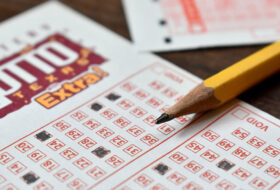
The lucky California lottery winner who took home half of a $395 million lotto jackpot is suing the California Lottery, the California State Lottery Commission, and the State of California over the unclaimed half of his Mega Millions prize.
On Dec. 6, Faramarz Lahijani filed a lawsuit in Los Angeles’ Superior Court claiming entitlement to the remaining portion of the multimillion jackpot. According to that filing, Lahijani alleges he bought two tickets from the Ventura Boulevard Chevron station in Encino that sold the winning tickets.
Lahijani said the lotto numbers used “were long ago chosen by his children” and played regularly for 30 years. Those numbers—21, 26, 53, 66, 70, and 13—matched the five white ball and one Mega Ball numbers drawn in the Dec. 8, 2023 draw.
However, after the draw revealed two jackpot winners, Lahijani said he found only one of the identical tickets, while the other remains missing. Despite the misplaced ticket, Lahijani says he is “entitled to the entire jackpot” as the draw’s “sole winner.”
In a statement shared with KTLA, California Lottery spokesperson Carolyn Becker declined to speak on the case.
It would not be appropriate for the California Lottery to comment on an active lawsuit or any pending litigation to protect the integrity of the process involved.
Lawsuit argues Lotto rules back Lahijani claim
The main argument underpinning Lahijani’s case is the belief the defendants have sufficient information to prove Lahijani is the rightful jackpot winner.
The complaint further alleges that Lahijani’s ticket purchase created a contractual relationship between the buyer (Lahijani) and the seller (the California Lottery).
The documents argue that the Lottery breached that contract by “unreasonably failing to honor” Lahijani’s claim for the whole prize. Lahijani also contends that the Lottery failed to enforce its rules by wrongly denying a valid prize-winning ticket.
As a result, the filing says that the Lottery failed to uphold its “mandatory duty to ensure that the California State Lottery is administered and operated with integrity, security, honesty, and fairness.”
Lahijani’s suit also includes a contingency argument in case the Lottery fails to determine that he purchased the second winning ticket. In essence, it alleges that as the only winner to come forward, he is the sole jackpot winner.
Lahijani bases his claim on a lotto regulation that states, “winners for each prize level in a particular draw share equally in the prize pool for that prize level.”
Lahijani argues that this entitles him to the entire jackpot as the only valid winner to come forward.
As such, because plaintiff is the only “winner” by virtue of his having timely submitted the first matching ticket, plaintiff is entitled to the entirety of the jackpot from defendants.
Currently, lotto regulations allocate any unclaimed lotto prizes to California public education. In 2023-24 alone, the Lottery contributed over $2 billion to public education funds.
Should Lahijani prevail, the decision could seemingly have lasting implications on the state’s education coffers.
Lotto regs: Prize claims require valid ticket
In his complaint, Lahijani alleges the Lottery has not explained its decision not to recognize him as the purchaser of both winning tickets.
However, California Lottery regulations provide some answers. According to section 5.4.2., a winner is defined as follows:
A Winner is a Player who is not a Disqualified Person, who legally acquires a winning Ticket and owns it at the time it is determined to be a winning Ticket either by a Draw or by scratching the play area. Except as otherwise provided in these regulations, a Winner need not have purchased the Ticket; however, the Winner must Claim the Prize.
Further, section 5.5.3 stipulates a prize claim requires the submittal of a valid ticket and claim form:
Winners bear sole responsibility for ensuring that winning Tickets or WVT Claim Receipts and Claim Forms reach the Lottery intact and within the applicable Claim Period. The Lottery is not responsible for Claims until they are successfully delivered to the Lottery. The Lottery is not responsible for late Claims or for postage-due, misdirected, misdelivered, stolen, or lost Tickets or Claims.
Finally, section 5.5.4., maintains that players are “solely” responsible for ticket security.
Players are solely responsible for securing their Tickets against theft, loss, damage, or destruction. General criminal activity involving theft of Lottery Tickets from members of the public will not be investigated by the Lottery. Such crimes should be reported to appropriate law enforcement authorities. However, credible reports of alleged theft or fraud perpetrated by Lottery employees or Lottery Retailers will be investigated by the Lottery.
Citing Prejudice Lahijani requests new judge
On Dec. 4, Lahijani also filed an official lotto claim for the remaining $197.5 million prize, ahead of the ticket’s expiration over the Dec. 7-8 weekend. He said in his complaint that the action was “out of an abundance of caution” to preserve his rights to the entire jackpot.
The lawsuit further claims the Lottery’s refusal to award Lahijani the whole jackpot has caused financial loss and emotional distress.
Plaintiff has suffered financial hardship and emotional distress, including but not limited to, embarrassment, anxiety and mental anguish, all to his general damage in a sum in excess of $50,000.00.
As a remedy, Lahijani seeks a resolution declaring him the owner of the second winning ticket and rightful claimant to the contested funds. He also asks for damages, costs incurred, and a trial by jury.
On Dec. 9, the California court system assigned the pending case to Judge Holly J. Fujie.
However, Lahijani—citing prejudice—filed a Peremptory Challenge to Judicial Officer on Dec. 11, seeking a new judge. A notice of reassignment filed the same day notes Judge Lia Martin will now hear the case.





